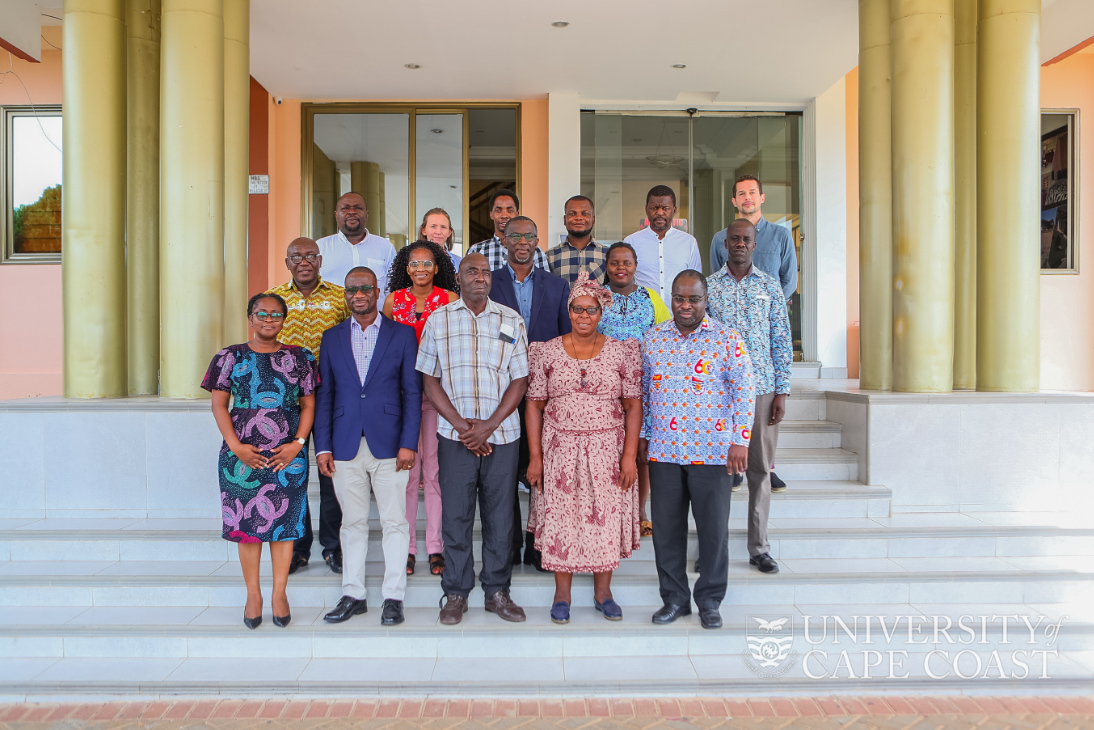The mid-term project review of the Mobilising Farmer Organisation for Sustainable Agriculture in Sub-Saharan Africa (FOMPO) Project has held been at the University of Cape Coast.
The 4-year FOMPO project (2020-2024), which is in its penultimate year is being implemented by the Directorate of Research, Innovation and Consultancy (DRIC), UCC. The project seeks to promote Sustainable Agriculture Development through collaborative research between academia and civil society. This is very important in the context of the UCC Research Agenda, which intends to catalyse societal impact beyond scholarly research outputs and outcomes.
The twofold aim of FOMPO project includes creating an understanding of the emergence, development and outcomes of farmer mobilization for sustainable and smallholder-centered agricultural development in SSA, drawing on evidence from Ghana, Uganda, and Zimbabwe. It also aims at strengthening action-oriented research capacity for critically engaged research for sustainable agricultural development in participating countries.
The project approach emphasises the scientific and societal benefits of pursuing comparative research based on profound collaboration between academia and civil society. The project involves case-based in-depth fieldwork, theoretically guided by the synthesis approach to social movement studies which highlight the interactions between three core aspects: framing processes, mobilising structures, and political opportunity. Besides generating practically useful knowledge and advancing theory, the project will build research capacity for critically engaged, collaborative research on social mobilisation around sustainable rural development in SSA. To ensure needs-based research and effective knowledge exchange between academia and society, the FOMPO project adopted a collaborative approach with close academic-civil society interaction throughout the project.
The weeklong meeting was attended by participants from Ghana (Peasant Farmers Association of Ghana, University of Cape Coast), Uganda (Lira University, Eastern and Southern Africa Small-scale Farmers’ Forum - ESAFF), Zimbabwe (Sam Moyo African Institute for Agrarian Studies, the Zimbabwe Smallholder Organic Farmers Forum ZIMSOFF) and Sweden (Lund University, University of Gothenburg, Malmo University).
In his opening remarks on behalf of the Pro Vice-Chancellor (Prof Rosemond Boohene), the Provost of the College of Agriculture and Natural Sciences, Professor Moses Jojo Eghan, underscored the need for best available technology in agriculture to enhance productivity and income for farmers. He indicated that population increases require concomitant increases in yields to ensure food security. Therefore, there is opportunity to integrate technology in smallholder farming to achieve sustainable food production.
The country co-lead for the FOMPO Project, Prof. Angela Akorsu, in her remarks, explained that the project team members would share data collection and findings on specific farmer organizations in rural communities in their respective countries.
She added that the team would make conscious efforts to disseminate their findings to policy makers and would endeavor to train three (3) PhD students through the research. She noted that the project also aimed at producing ten (10) peer review scientific papers on sustainable agriculture development using small holder farmer organizations as vehicle.
The Director of the Directorate of Research Innovation and Consultancy (DRIC), Prof David Teye Doku, in his address at the opening ceremony, stressed the need for a more robust and sustainable food system in the wake of imperfect markets and climate change. He hoped that the outcome of the research would contribute to improving small holder farming in Sub-Saharan Africa.
Participants from the four countries subsequently paid working visits to smallholder farms at Asutuare in the Greater Accra Region.
Source: Documentation and Information Section-UCC


